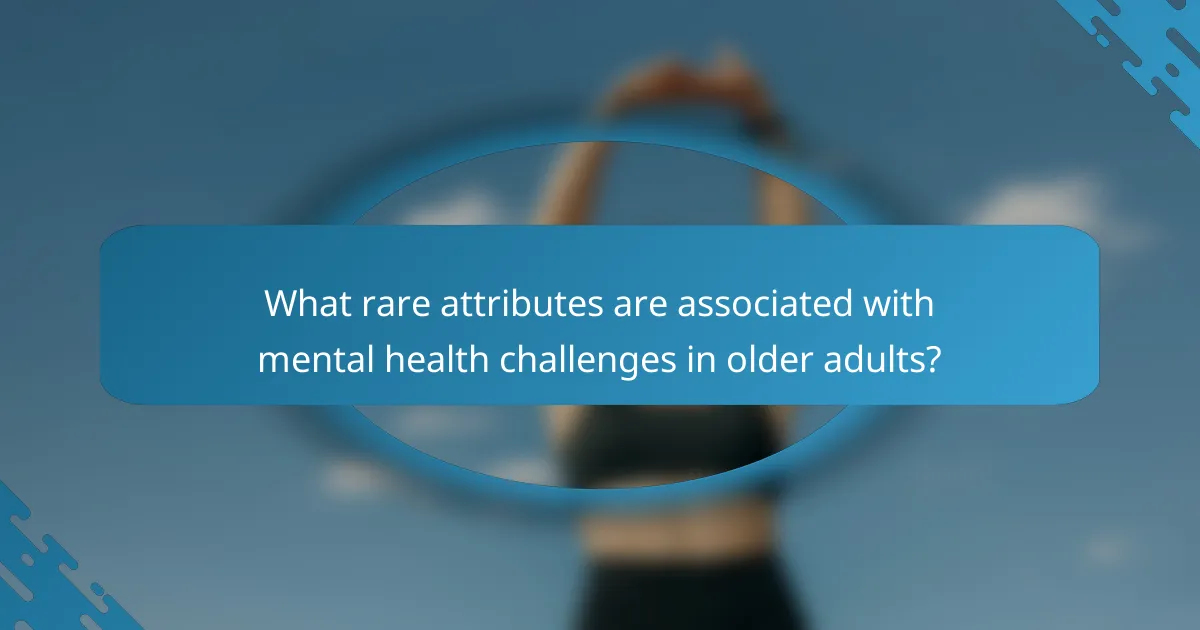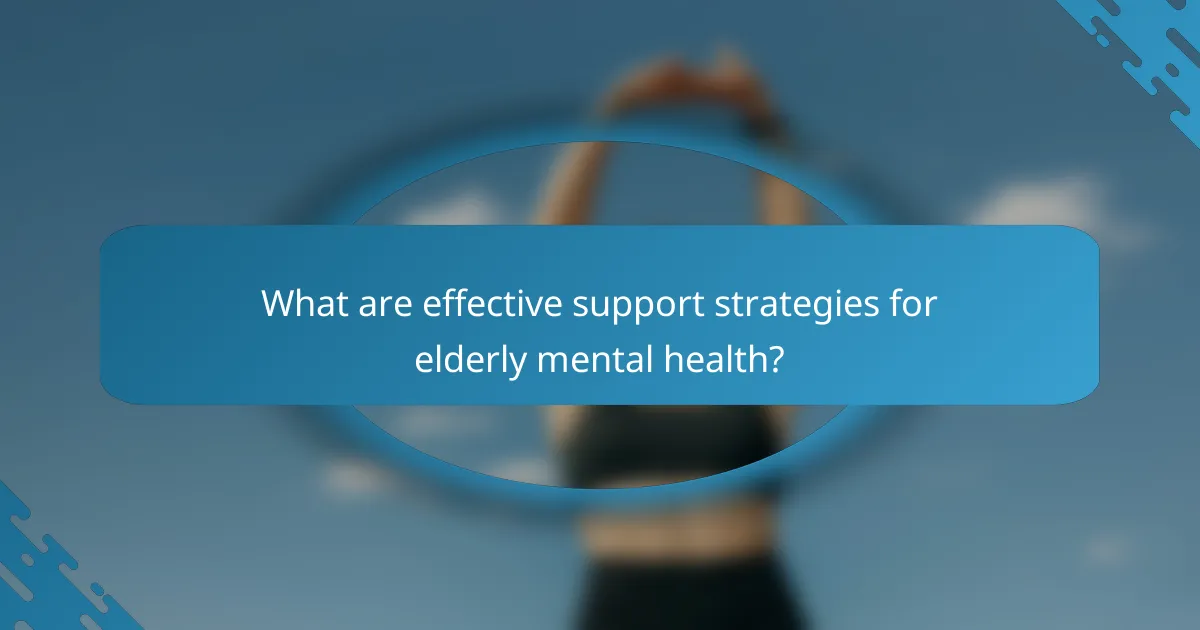Mental health challenges in older adults significantly impact their quality of life. Isolation often leads to loneliness, while depression affects nearly 7 million individuals in this age group. Cognitive decline, including dementia, impairs memory and daily functioning. Understanding these issues is essential for developing effective support and intervention strategies.

What are the common mental health challenges faced by older adults?
Older adults commonly face mental health challenges such as isolation, depression, and cognitive decline. Isolation can result from loss of loved ones or reduced social engagement, leading to feelings of loneliness. Depression affects approximately 6 million older adults, often going undiagnosed. Cognitive decline includes conditions like dementia, impacting memory and daily functioning. Understanding these challenges is crucial for effective support and intervention.
How does isolation impact mental health in the elderly?
Isolation significantly worsens mental health in the elderly, leading to increased depression and cognitive decline. Social withdrawal reduces emotional support and exacerbates feelings of loneliness. Studies show that isolated seniors are at a higher risk of developing depressive symptoms, impacting their overall well-being. Moreover, isolation can lead to cognitive decline, as social interaction is crucial for maintaining mental acuity. Addressing isolation through community programs and social engagement can improve mental health outcomes for older adults.
What are the signs and symptoms of depression in older adults?
Signs and symptoms of depression in older adults include persistent sadness, loss of interest in activities, changes in appetite, sleep disturbances, fatigue, and difficulty concentrating. These symptoms may vary in intensity and can significantly impact daily life.
Common indicators also include social withdrawal, feelings of hopelessness, and physical complaints without clear medical causes. Older adults may express irritability or frustration, which can be mistaken for normal aging.
Unique attributes of depression in this demographic often involve co-occurring health conditions, making diagnosis challenging. According to studies, approximately 5% of older adults experience major depression, yet many do not seek help.
Recognising these signs early is crucial for effective intervention and support. Mental health resources should be readily accessible to address these challenges and improve overall well-being.
How does cognitive decline affect emotional well-being?
Cognitive decline significantly impacts emotional well-being in older adults, often leading to increased feelings of isolation and depression. As cognitive abilities diminish, individuals may struggle with social interactions, resulting in withdrawal from relationships and activities. This isolation can exacerbate depressive symptoms, creating a cycle that further deteriorates mental health. Research indicates that nearly 60% of older adults experiencing cognitive decline report symptoms of depression, highlighting the urgent need for supportive interventions.

What are the universal attributes of mental health challenges in older adults?
Mental health challenges in older adults universally include isolation, depression, and cognitive decline. These issues often stem from factors like loss of loved ones, physical health problems, and reduced social interactions.
Isolation can lead to feelings of loneliness, which significantly impact mental well-being. Depression is prevalent, affecting nearly 7 million older adults in the U.S. Cognitive decline, including conditions like dementia, affects memory and daily functioning.
Addressing these challenges requires understanding their root attributes, such as social support systems and access to mental health resources. Unique attributes include the stigma around mental health in older adults, which can hinder seeking help.
Awareness and targeted interventions can mitigate these challenges, promoting better mental health outcomes for older adults.
How do social connections influence mental health?
Social connections significantly impact mental health by reducing feelings of isolation and depression. Strong relationships provide emotional support, which can mitigate cognitive decline in older adults. Research shows that social engagement correlates with improved mental well-being, enhancing resilience against mental health challenges. Regular interactions with friends and family can lead to lower rates of depression and anxiety, emphasising the importance of maintaining social ties as a protective factor for mental health.
What role does physical health play in mental well-being?
Physical health significantly influences mental well-being in older adults. Good physical health can reduce the risk of depression and cognitive decline, while poor physical health often exacerbates feelings of isolation. Regular exercise and proper nutrition improve mood and cognitive function. Studies show that older adults with chronic illnesses are more likely to experience mental health challenges. Addressing physical health can lead to improved mental health outcomes.

What unique factors contribute to mental health issues in the elderly?
Social isolation, chronic health conditions, and cognitive decline uniquely contribute to mental health issues in the elderly. These factors create a cycle that exacerbates feelings of loneliness and depression. For instance, approximately 28% of older adults experience depression, often linked to social isolation. Cognitive decline can further impair social interactions, leading to increased isolation. Addressing these unique factors is crucial for improving mental health outcomes in older adults.
How do life transitions impact mental health?
Life transitions significantly impact mental health in older adults, often leading to isolation, depression, and cognitive decline. Major changes, such as retirement or loss of loved ones, can trigger feelings of loneliness and sadness. Studies indicate that approximately 30% of older adults experience depressive symptoms during significant life changes. Additionally, cognitive decline can be exacerbated by social isolation, highlighting the importance of social connections. Engaging in community activities and maintaining relationships can mitigate these mental health challenges.
What are the effects of medication on mental health in older adults?
Medication can significantly impact mental health in older adults, often exacerbating issues like isolation, depression, and cognitive decline. Certain medications, particularly those affecting neurotransmitters, can lead to side effects that worsen mental health conditions. For instance, antidepressants may improve mood but can also cause anxiety or agitation.
Additionally, polypharmacy, the concurrent use of multiple medications, increases the risk of adverse effects, including confusion and memory problems. Older adults may experience unique sensitivities to medications, requiring careful management to avoid complications. Studies indicate that nearly 40% of older adults report negative mental health effects from their medications, highlighting the need for regular assessment and adjustment of treatment plans.
Effective communication between healthcare providers and patients is crucial. Regular reviews of medication regimens can help identify and mitigate adverse effects, ensuring that mental health remains a priority in the overall health management of older adults.

What rare attributes are associated with mental health challenges in older adults?
Social withdrawal, unique coping mechanisms, and atypical emotional responses are rare attributes associated with mental health challenges in older adults. These factors can exacerbate issues like depression and cognitive decline. For instance, older adults may experience heightened isolation due to mobility limitations, leading to increased feelings of loneliness. Additionally, some may develop unique ways of coping, such as engaging in repetitive behaviours, which can mask underlying mental health issues. Recognising these rare attributes is crucial for tailored interventions and support strategies.
How do cultural perceptions influence mental health support?
Cultural perceptions significantly shape mental health support for older adults facing challenges like isolation and depression. Societal attitudes often dictate the stigma surrounding mental health, impacting individuals’ willingness to seek help. Cultural norms can either encourage open discussions about mental health or perpetuate silence, affecting access to resources. For instance, in collectivist cultures, family dynamics may prioritise collective well-being, sometimes overshadowing individual mental health needs. As a result, older adults may experience limited support, exacerbating feelings of isolation and cognitive decline. Understanding these cultural influences is essential for developing effective mental health interventions tailored to diverse populations.
What is the impact of chronic illness on mental health?
Chronic illness significantly impacts mental health, leading to increased isolation, depression, and cognitive decline in older adults. These individuals often experience a loss of independence, which can exacerbate feelings of loneliness. Research shows that nearly 30% of older adults with chronic conditions report symptoms of depression. As a result, mental health support is crucial for improving their overall well-being. Addressing these challenges can enhance quality of life and promote healthier aging.

What are effective support strategies for elderly mental health?
Effective support strategies for elderly mental health include fostering social connections, providing mental health education, and ensuring access to professional care. Social engagement reduces feelings of isolation, which is a common issue. Programs that encourage group activities or community involvement can significantly enhance emotional well-being. Education about mental health helps older adults recognise symptoms of depression or cognitive decline early, leading to timely intervention. Access to mental health professionals ensures that those in need receive proper diagnosis and treatment, improving overall mental health outcomes.
How can family members support their elderly loved ones?
Family members can support their elderly loved ones by actively engaging in their lives and addressing mental health challenges. Regular communication helps reduce feelings of isolation. Encouraging participation in social activities can combat depression and improve cognitive function. Additionally, being attentive to changes in behaviour allows for timely intervention when cognitive decline is suspected. Providing a safe and supportive environment fosters emotional well-being and encourages open discussions about mental health.
What community resources are available for mental health support?
Community resources for mental health support include local agencies, hotlines, and online platforms. These services offer counselling, support groups, and educational resources tailored to older adults facing isolation, depression, and cognitive decline. Many organisations provide free or low-cost services, ensuring accessibility. For example, the National Alliance on Mental Illness (NAMI) offers a helpline and local chapters for support. Additionally, senior centres often host workshops and activities that promote social engagement, helping combat feelings of loneliness.
What best practices can improve mental health outcomes for older adults?
Engaging older adults in social activities, promoting physical health, and providing mental health resources can significantly improve their mental health outcomes. Social interaction reduces feelings of isolation, while regular exercise enhances mood and cognitive function. Additionally, access to therapy and support groups addresses depression and cognitive decline effectively. As a result, these practices foster a supportive environment that encourages overall well-being in older adults.
How to create a supportive environment?
Creating a supportive environment for older adults facing mental health challenges involves fostering connection and understanding. Engage in regular communication, encourage social activities, and create safe spaces for expression.
Promote access to resources such as mental health professionals and support groups. Incorporate routines that include physical activity, which can enhance mood and cognitive function.
Utilise technology to maintain connections with family and friends, reducing feelings of isolation. Offer education on mental health to caregivers and family members to enhance empathy and support.
By implementing these strategies, the environment becomes a key factor in mitigating isolation, depression, and cognitive decline among older adults.
What activities promote mental well-being?
Engaging in activities like socialising, exercising, and pursuing hobbies promotes mental well-being in older adults. These activities help combat isolation, reduce symptoms of depression, and support cognitive function. Regular social interaction can significantly enhance emotional health. Physical exercise has been shown to improve mood and cognitive abilities. Creative hobbies stimulate the brain and provide a sense of purpose.
What common mistakes should be avoided in supporting elderly mental health?
To support elderly mental health effectively, avoid common mistakes such as dismissing feelings of isolation, neglecting social engagement, and overlooking signs of depression. Recognise that cognitive decline can affect communication, so be patient and attentive. Prioritise open dialogue to foster trust and understanding.